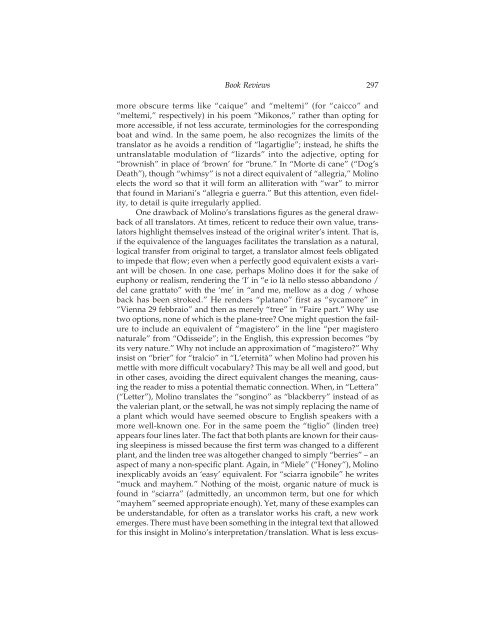Journal of Italian Translation
Journal of Italian Translation
Journal of Italian Translation
Create successful ePaper yourself
Turn your PDF publications into a flip-book with our unique Google optimized e-Paper software.
Book Reviews 297<br />
more obscure terms like “caique” and “meltemi” (for “caicco” and<br />
“meltemi,” respectively) in his poem “Mikonos,” rather than opting for<br />
more accessible, if not less accurate, terminologies for the corresponding<br />
boat and wind. In the same poem, he also recognizes the limits <strong>of</strong> the<br />
translator as he avoids a rendition <strong>of</strong> “lagartiglie”; instead, he shifts the<br />
untranslatable modulation <strong>of</strong> “lizards” into the adjective, opting for<br />
“brownish” in place <strong>of</strong> ‘brown’ for “brune.” In “Morte di cane” (“Dog’s<br />
Death”), though “whimsy” is not a direct equivalent <strong>of</strong> “allegria,” Molino<br />
elects the word so that it will form an alliteration with “war” to mirror<br />
that found in Mariani’s “allegria e guerra.” But this attention, even fidelity,<br />
to detail is quite irregularly applied.<br />
One drawback <strong>of</strong> Molino’s translations figures as the general drawback<br />
<strong>of</strong> all translators. At times, reticent to reduce their own value, translators<br />
highlight themselves instead <strong>of</strong> the original writer’s intent. That is,<br />
if the equivalence <strong>of</strong> the languages facilitates the translation as a natural,<br />
logical transfer from original to target, a translator almost feels obligated<br />
to impede that flow; even when a perfectly good equivalent exists a variant<br />
will be chosen. In one case, perhaps Molino does it for the sake <strong>of</strong><br />
euphony or realism, rendering the ‘I’ in “e io là nello stesso abbandono /<br />
del cane grattato” with the ‘me’ in “and me, mellow as a dog / whose<br />
back has been stroked.” He renders “platano” first as “sycamore” in<br />
“Vienna 29 febbraio” and then as merely “tree” in “Faire part.” Why use<br />
two options, none <strong>of</strong> which is the plane-tree? One might question the failure<br />
to include an equivalent <strong>of</strong> “magistero” in the line “per magistero<br />
naturale” from “Odisseide”; in the English, this expression becomes “by<br />
its very nature.” Why not include an approximation <strong>of</strong> “magistero?” Why<br />
insist on “brier” for “tralcio” in “L’eternità” when Molino had proven his<br />
mettle with more difficult vocabulary? This may be all well and good, but<br />
in other cases, avoiding the direct equivalent changes the meaning, causing<br />
the reader to miss a potential thematic connection. When, in “Lettera”<br />
(“Letter”), Molino translates the “songino” as “blackberry” instead <strong>of</strong> as<br />
the valerian plant, or the setwall, he was not simply replacing the name <strong>of</strong><br />
a plant which would have seemed obscure to English speakers with a<br />
more well-known one. For in the same poem the “tiglio” (linden tree)<br />
appears four lines later. The fact that both plants are known for their causing<br />
sleepiness is missed because the first term was changed to a different<br />
plant, and the linden tree was altogether changed to simply “berries” – an<br />
aspect <strong>of</strong> many a non-specific plant. Again, in “Miele” (“Honey”), Molino<br />
inexplicably avoids an ‘easy’ equivalent. For “sciarra ignobile” he writes<br />
“muck and mayhem.” Nothing <strong>of</strong> the moist, organic nature <strong>of</strong> muck is<br />
found in “sciarra” (admittedly, an uncommon term, but one for which<br />
“mayhem” seemed appropriate enough). Yet, many <strong>of</strong> these examples can<br />
be understandable, for <strong>of</strong>ten as a translator works his craft, a new work<br />
emerges. There must have been something in the integral text that allowed<br />
for this insight in Molino’s interpretation/translation. What is less excus-
















